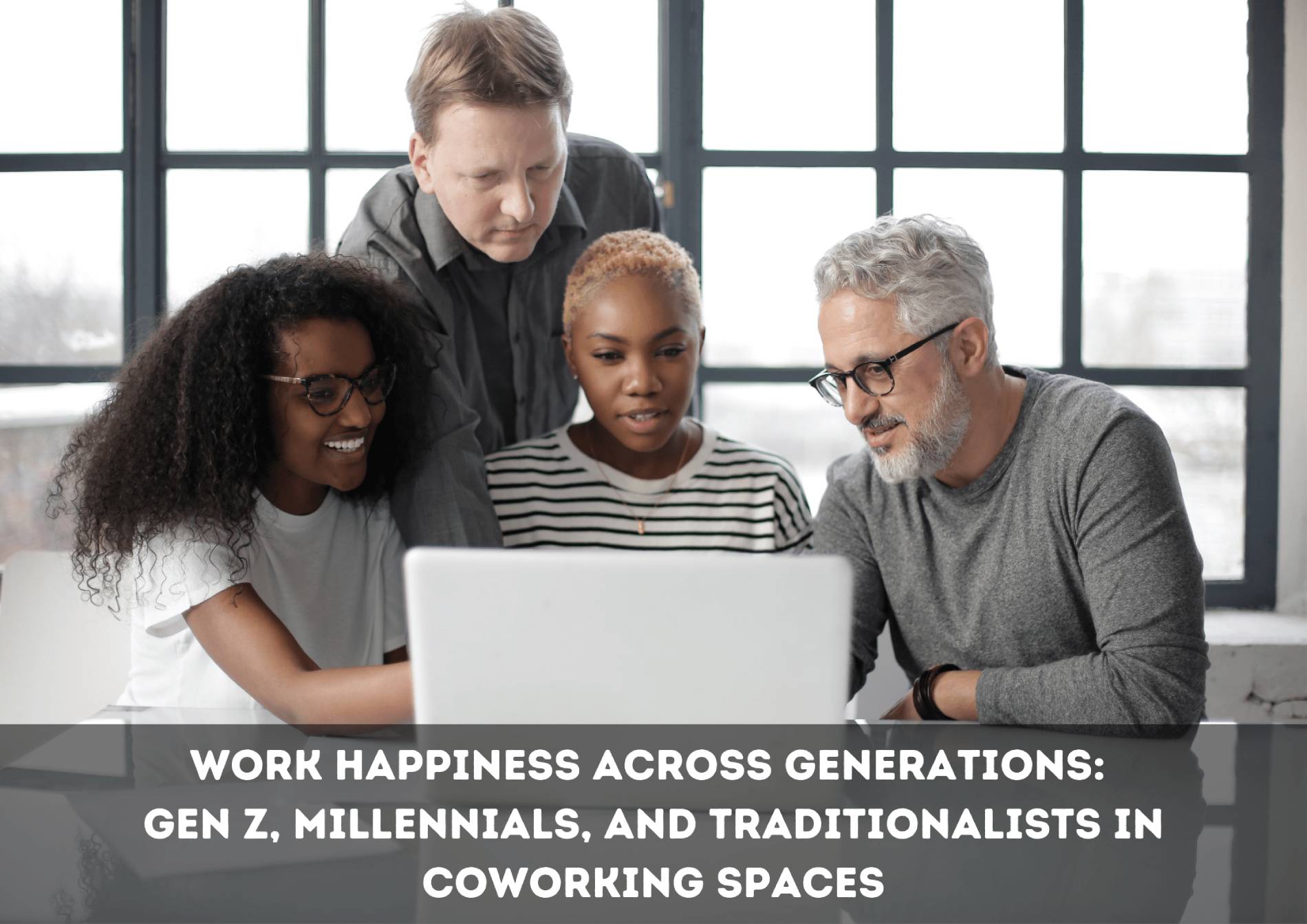Coworking spaces have revolutionized the way professionals across generations approach work. They provide a flexible, collaborative, and vibrant environment that caters to a diverse workforce, including Gen Z, Millennials, and Traditionalists (formerly known as Boomers). Each generation brings distinct values, expectations, and preferences to the workplace, shaping their experiences and levels of happiness in coworking spaces. Understanding these generational differences is crucial for fostering an inclusive and productive environment.
Gen Z: Digital Natives Shaping the Future of Work
Key Characteristics
Gen Z, born between 1997 and 2012, are the first generation to grow up with technology as a central part of their lives. They are highly adaptable, tech-savvy, and value innovation. Having entered the workforce in a rapidly changing digital landscape, Gen Z professionals prioritize flexibility, mental health, and meaningful work.
Happiness in Coworking Spaces
1. Tech-Enabled Workspaces
Coworking spaces equipped with advanced technology, such as high-speed internet, smart tools, and virtual meeting platforms, resonate with Gen Z. These features enable them to work efficiently and stay connected.
2. Collaboration and Networking
Gen Z thrives in environments that foster collaboration. Coworking spaces with open layouts, brainstorming areas, and community events provide opportunities to connect with like-minded professionals and mentors.
3. Focus on Well-Being
Mental health and work-life balance are non-negotiables for Gen Z. Amenities like meditation rooms, fitness facilities, and wellness programs contribute to their overall happiness and productivity.
4. Creative Freedom
Gen Z values creativity and self-expression. Coworking spaces that support innovation through workshops, design labs, and creative zones align with their desire for meaningful and stimulating work.
Millennials: Balancing Purpose and Flexibility
Key Characteristics
Millennials, born between 1981 and 1996, are often described as the “workforce disruptors.” They champion flexibility, purpose-driven work, and continuous learning. Having experienced economic instability and rapid technological advancement, Millennials seek workplaces that align with their values and provide opportunities for growth.
Happiness in Coworking Spaces
1. Work-Life Integration
Coworking spaces that offer flexible working hours, remote options, and family-friendly facilities appeal to Millennials. They appreciate the freedom to balance personal and professional responsibilities.
2. Community and Belonging
Millennials value a sense of community. Coworking spaces with shared kitchens, networking events, and collaborative projects foster relationships and a feeling of belonging.
3. Professional Development
Opportunities for upskilling and learning are critical for Millennials. Spaces that host workshops, seminars, and mentorship programs enhance their career satisfaction and happiness.
4. Eco-Friendly and Ethical Practices
Millennials are environmentally conscious and socially responsible. Coworking spaces that embrace sustainability, ethical practices, and social impact initiatives align with their values.
Traditionalists: Experience and Stability in the Modern Workplace
Key Characteristics
Traditionalists, born between 1946 and 1964, bring decades of experience, resilience, and a strong work ethic to the table. While they may not have grown up with technology, many Traditionalists have embraced digital tools and continue to contribute significantly to the workforce.
Happiness in Coworking Spaces
1. Comfort and Accessibility
Traditionalists value comfort and ergonomics. Coworking spaces with quiet zones, ergonomic furniture, and easily accessible facilities enhance their productivity and well-being.
2. Structured Environments
While they appreciate flexibility, Traditionalists often prefer some level of structure. Spaces that provide clear guidelines, designated work areas, and private offices cater to their needs.
3. Opportunities to Mentor
Traditionalists thrive on sharing their knowledge and expertise. Coworking spaces that facilitate mentorship programs and intergenerational collaboration foster a sense of purpose and happiness.
4. Technology Support
While many Traditionalists have adapted to technology, they may require support. Spaces with accessible tech assistance and user-friendly tools help bridge the gap and ensure a seamless work experience.
Common Themes Across Generations
Despite their differences, Gen Z, Millennials, and Traditionalists share several common needs that contribute to happiness in coworking spaces:
1. Flexibility
Flexibility in work hours, desk arrangements, and work styles is universally appreciated. Coworking spaces that offer hot desks, private offices, and remote working options cater to this demand.
2. Community and Networking
A sense of community is vital for fostering engagement and reducing feelings of isolation. Regular events, workshops, and shared spaces help build meaningful connections across generations.
3. Technology Integration
High-quality tech infrastructure is essential for all generations, enabling seamless communication, collaboration, and productivity.
4. Work-Life Balance
Amenities that support well-being, such as wellness rooms, fitness areas, and recreational zones, contribute to overall happiness and productivity.
Designing Coworking Spaces for Multigenerational Happiness
To create an inclusive environment, coworking spaces must:
Provide Customization: Offer personalized workspaces and amenities to meet individual preferences.
Incorporate Diversity: Design spaces that accommodate various work styles, from open layouts to private offices.
Foster Collaboration: Encourage intergenerational collaboration through mentorship programs and team projects.
Promote Inclusivity: Ensure the space is accessible to all, with ergonomic furniture, clear signage, and user-friendly tech tools.
The Role of Coworking Operators
Coworking operators play a critical role in fostering happiness across generations. By conducting regular surveys, engaging with members, and adapting to changing needs, operators can create spaces that cater to a diverse workforce.
Coworking spaces have the potential to bridge generational gaps and create a harmonious environment for Gen Z, Millennials, and Traditionalists. By understanding the unique needs and preferences of each generation, these spaces can foster collaboration, innovation, and happiness, driving success for individuals and businesses alike.
